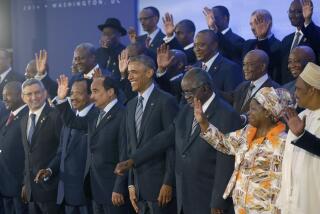Africa Drowns in a Pool of Oil
President Bush’s Africa trip next week provides a rare opportunity to put the continent’s pressing problems at the top of the international agenda.
Scarred by disease, ethnic violence and economic stagnation, Africa needs more help than the United States can or is willing to offer. And this visit, like other presidents’ trips to the region, is not likely to dramatically change the situation for the impoverished continent.
But there is at least one gesture Bush can make that would have a positive effect on Africans, and it wouldn’t cost U.S. taxpayers a penny. He can lean on Big Oil to clean up its role in the region’s corrosive corruption.
Determined to reduce America’s dependence on oil imported from the Middle East, the Bush administration has been keen on developing oil fields in many African countries.
A task force headed by Vice President Dick Cheney predicted two years ago that Africa would become the fastest-growing source of oil for the American market. But Africa’s oil bonanza seems to affect its people in an adverse way.
A recent report by Catholic Relief Services showed that countries like Gabon, Angola and Nigeria, which discovered oil several decades ago, had fared worse when it came to economic growth and poverty reduction than many African countries without oil.
Nigeria, one of the stops on Bush’s itinerary, has received more than $300 billion in oil revenues over the last 25 years, yet it has a per capita income of less than $1 a day. Ethnic rivalries over the distribution of oil revenue there have cost the lives of thousands.
In Angola, the International Monetary Fund has found that $1 billion of up to $5 billion in state revenue -- most of it generated by oil contracts -- goes missing every year. In the late 1990s, according to the London human rights organization Global Witness, millions of dollars handed to President Jose Eduardo dos Santos by Exxon Mobil, among others, helped him prolong Angola’s civil war.
No one doubts that the primary villains are Africa’s corrupt dictators, whose moral compass the U.S. cannot alter. But it doesn’t help that Western companies, citing confidentiality agreements and competitive concerns, generally refuse to disclose the fees, royalties and other payments they make in African oil countries.
There is plenty of evidence that companies are hiding what amounts to payoffs and bribes.
In dealings with Equatorial Guinea, the Los Angeles Times reported, U.S. oil companies deposited more than $300 million into bank accounts in Washington solely controlled by the country’s president.
In Gabon and other countries in the 1990s, the then-state-owned French oil giant ELF Aquitaine had such a huge slush fund for buying African influence that, according to testimony in an ongoing embezzlement trial in Paris, its executives enriched themselves by dipping into it at the same time millions went to the leaders of oil states.
A British initiative to increase transparency in African oil deals, promoted by Prime Minister Tony Blair, is now at the center of a transatlantic tug of war. The program calls on oil companies to voluntarily disclose their payments for oil leases and development rights in Africa, which would allow for accountability on both sides of the transactions.
The initiative is supported by six countries, including France, India and South Africa. Two major European oil companies, British Petroleum and Royal Dutch/Shell, also support the initiative, on the condition that all other major companies abide by the proposed norms.
But America’s Big Oil interests, spearheaded by Exxon Mobil and ChevronTexaco, resist the voluntary initiative, fearing in part that such a move is a slippery slope likely to make disclosure of payments mandatory in the future. (In fact, a separate international proposal, backed by financier George Soros, calls for mandatory reporting as a prerequisite for listing oil companies on the world’s stock exchanges.)
Without all the oil giants complying, the British initiative has no chance of taking off. After all, companies that report where all their money goes are likely to lose lucrative contracts to those who can shield payments and avoid accountability.
This is where Bush’s authority comes into play. If anything can push American companies to support the initiative, it is a president calling upon his friends in the oil industry to be socially responsible.
The purpose of Bush’s trip is to promote African democracy and prosperity. But the U.S. cannot preach to African countries about good governance when its own corporations take advantage of, and therefore sustain, a morally corrupt business climate that would never be tolerated here at home.
By conservative estimates, the oil rush is likely to bring African governments some $200 billion over the next decade. But unless the U.S. acts to achieve transparency and accountability in the continent’s oil dealings, that money will only sow more of what Bush says he wants to roll back: conflict, corruption and economic degradation.
More to Read
Sign up for Essential California
The most important California stories and recommendations in your inbox every morning.
You may occasionally receive promotional content from the Los Angeles Times.










